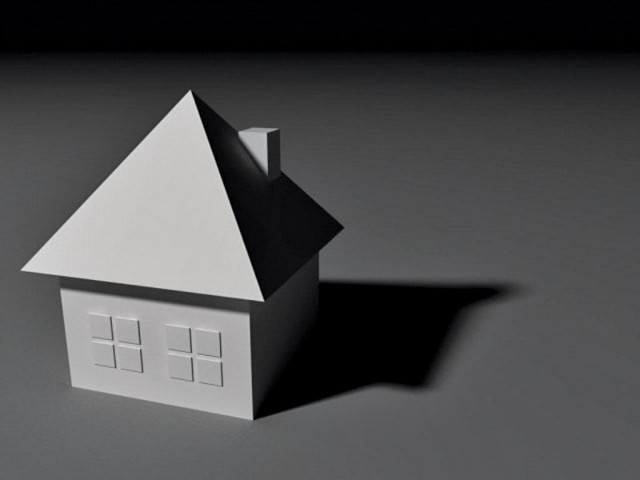'Illegal' occupants of federal employee residences brace for grand operation
Political leaders appeal to apex court to stop implementation of its order

Many such residential units have also been illegally divided into two or more smaller units. There are also many cases of illegal constructions where multiple storeys have been built on a house. STOCK IMAGE
Many houses meant for federal government employees in Karachi have been allegedly illegally occupied by retired employees, widows and families of deceased employees and other private persons.
To get such residential units vacated, the estate office of the housing and works ministry has decided to issue a final notice to the illegal occupants in the coming days. The residents will be asked to vacate the houses voluntarily. In case they fail to oblige, the residential units will be forcefully evicted in an operation that will begin on July 24. The operation will be jointly conducted by the estate office, Sindh government and law enforcement agencies.
It has also been reported that the evacuated residents will not be provided any alternative land or houses.
SHC rejects bail of man in illegal allotment case
A persisting issue
Estate Officer Obaiduddin told The Express Tribune that a three-judge bench of the SC, in its verdict on June 9, ordered the authorities to get illegally occupied federal residential units vacated.
According to the officer, there were a total of 7,882 residential units, including both houses and apartments, in the federal housing colonies in Karachi, of which 4,268 units - more than 50% - were unlawfully occupied.
Obaiduddin explained that retired employees and families of deceased employees were living in most of such units. However, a few cases have also been reported, especially in Martin Quarters, where residential units were illegally sold by their earlier occupants to private persons.
Many such residential units have also been illegally divided into two or more smaller units. There are also many cases of illegal constructions where multiple storeys have been built on a house. Some of the units have even been converted for commercial use.
The estate officer added that a majority of illegal residents do not pay rent, utility bills and other dues. The total liabilities on them have exceeded Rs3 billion, he claimed.
Illegal land allotment of Safari Park: SHC issues notices to revenue board, others
Explaining the rules, the officer said government employees living in a government housing unit can continue residing in the unit up to six months after retirement.
A significant number of the residential units have been occupied for more than 20 years, Obaiduddin said, adding that now all such units will be retrieved as the estate office had to comply with the SC order.
Eviction strategy
According to Obaiduddin, the housing ministry will conduct operations across the country in phases to retrieve government housing units.
For the operation in Karachi, a meeting has been held in the city which was presided over by the joint secretary of the housing ministry. The meeting was attended by representatives of the estate office, provincial government, police and other law enforcers.
It was decided in the meeting that before the operation, the illegal occupants of residential units will be asked to voluntarily vacate the units. If they fail to comply, a grand joint operation will be carried out with the help of the police and Rangers.
Illegal Housing Schemes: RDA officers told to take action
The meeting participants also resolved not to withstand any public or political pressure in this regard.
Calls for review
Meanwhile, residents of federal housing colonies and leaders of political parties have announced to file review petitions in the SC against its June 9 order.
A social figure of Martin Quarters, Kaleemul Haq Usmani, who is affiliated with the Jamaat-e-Islami, expressed concern over the possible operation in the locality. He said that the apex court only heard the estate office while the residents were not heard.
Usmani explained that there were several federal residential colonies in Karachi situated in Garden, Jahangir Road, Martin Quarters, Clifton Quarters, Jail Road Quarters, Jamshed Quarters, Old Lalukhet and other areas. He alleged that the estate office misinformed the court and that the ancestors of a majority of the residents living in those areas were living in those units since Partition.
Excavation causes house collapse, kills two children
Usmani also refuted the estate office's claims that many residents were not paying their dues. He also claimed that the estate office had also distributed ownership documents among the residents which they still possessed. It is only after getting possession of the houses that the residents built multiple storeys, he said.
Usmani also contended that the claim of the estate office over the land was also disputed as the Evacuee Trust Property Board also claimed that the land was theirs.
The JI leader appealed to the SC to stop the implementation of its order as the residents had not been heard.
Pak Sarzameen Party (PSP) President Anis Kaimkhani and Muttahida Qaumi Movement - Pakistan leader Aminul Haq also appealed to the SC to review its decision on humanitarian grounds.
Kaimkhani assured the residents of the colonies that the PSP would extend all possible legal support to them in this regard. Meanwhile, Haq said that the residents were in severe distress due to the possible operation at their houses.



















COMMENTS
Comments are moderated and generally will be posted if they are on-topic and not abusive.
For more information, please see our Comments FAQ